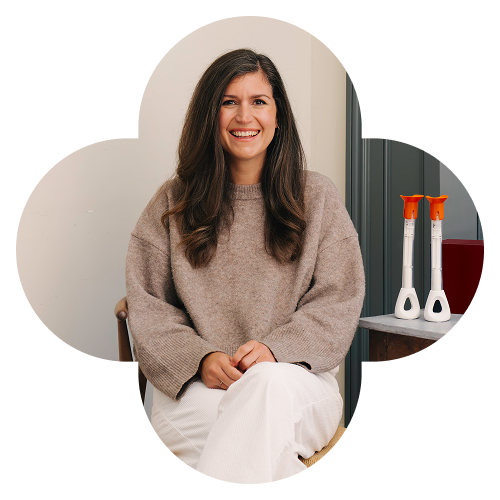We know how things can take a backseat when your primary goal is to get pregnant, juggling the ups and downs of the journey with, well… life. It’s tough, and it’s often left out of the conversation. It’s quite common for people to feel shame, guilt or low self-esteem, but we shouldn’t have to feel this way. While there’s no one-size-fits-all approach to looking after your mental health, we’ve laid out some options you may want to explore to find out what works best for you:
Start by acknowledging that navigating fertility is hard
Infertility is shitty. There. We said it. Honestly, it’s the worst journey many of us will go on, and it can feel like a total whirlwind of cycle tracking, ovulation testing and timing intercourse (unsexy, am I right?). This is enough to stress anyone out and add a strain on your mental health and your relationship. It’s ok to feel it. It’s ok to rage at the unfairness of it all. It’s ok for it to feel hard because it is. Full stop.
"If you’re going through it, know that you are in very good company – brilliant, brave, incredible people are in this club"
Then acknowledge how very not alone you are
As well as being shitty, infertility is also quite isolating – it’s easy for us to feel like we’re alone. Many people feel shame, guilt or low self-esteem. If you’re feeling these things, know that you’re not alone. Infertility affects 1 in 6 people, and yet it’s not talked about enough, so we feel isolated and worried. If you’re going through it, know that you are in very good company – brilliant, brave, incredible people are in this club and as they say - worst club, best members. If chatting to others helps, find community groups online. If not, then just know they’re out there, and they’re right there with you.
Now start setting boundaries
Ah yes, the B word. Very in vogue at the moment, yet still not easy to set (ahem, speaking from experience here 🫠). But boundaries are a brilliant foundation for your mental health. A boundary might look like unfollowing that friend on Instagram who just had a baby. It might look like telling your aunt to stop eyeing your stomach at every family gathering. It might just look like not attending a baby shower, or a family gathering where there will be kids or pregnant people. Your boundaries are what protect you from things that can trigger stress or negative emotion, and setting them is the best thing you can do to protect your mental health.
Reduce daily stress
“Yawn, they all say that”, I hear you say. Nope, not here. Note we said ‘daily’ stress, not stress. Daily stressors are the little things that happen day in, day out, that cause micro stress throughout your day. Hate grocery shopping? Get it delivered. Hate how dark it is in winter? Get a SAD lamp (they’re not that expensive). Hate cleaning? Ask your partner to pitch in, or – if you can – get support with cleaning from a service. The little things in our daily lives that make us heave a sigh all add up, and if you can take just one of them away, you’ll be taking a small but incredibly powerful step towards reducing stress in your life.

Engage in some Fertility Friendly self care
Now, if self care for you is an enormous martini, then maybe skip over this section (also, good for you, we all need those sometimes). But seriously, there are some little things you can do that are fertility friendly and also support your mental health. Here are a few:
- Meditation – guided meditations are brilliant, and help lower heart rates, relieve anxiety and regulate breathing. Try a free one on YouTube, or download Headspace or Calm if you want a fancy experience.
- Journaling – get it out of your head and on to paper. Doesn’t need to be fancy. Tess once had a girlfriend whose journaling was just a block of Post It notes, with one thought a day jotted down. Whatever this looks like for you, writing it down is enormously beneficial.
- Acupuncture – if this is available to you, go for it. It’s an hour in a room with someone who is often fertility-trained. It’s cosy, it’s peaceful, it’s also the only holistic treatment that the HFEA has given the green light for fertility.
- Yoga – same benefits as meditation, except you actually have to work for it. But seriously, yoga is great for moving, stretching, and taking your mind off things.
Think about joining a Support Group
Yep, these can be SUPER daunting. So let’s try this – join one of Béa’s support groups. They’re every month, they’re totally free, and they’re hosted by our brilliant coach Sandy and Care Team Lead Nicole. You can pop in to Zoom with your camera off, sip tea whilst listening to everyone else’s tea (☕) and leave feeling a little less alone. We get that “a problem shared is a problem halved” doesn’t really apply to fertility, but getting to hear from others on a similar journey can really help. Also, Sandy and Nicole are warm, brilliant and hilarious. There isn’t an innuendo that Sandy hasn’t heard of, so try her. I promise, you won’t regret it.
Book a Fertility Support Session with Sandy
Finally, if the above isn’t right for you, then book a session with Sandy. We offer 2 free Fertility Consultations with Sandy for every 3-Cycle Béa Fertility Treatment. You can bring whatever you want into that conversation.
Some things to note:
1) You can take your time – no rushing, no 5-minute appointments. It’s your time, we’re here for you.
2) There is absolutely no judgement. Whatever you want to ask, just ask it. Hate your pregnant friend? Yep, we get it. No need to explain yourself here.
3) It’s completely confidential. Nothing goes anywhere – the call is yours and yours alone.


Share:
Acupuncture and fertility - can it actually help?
Announcing Béaby Isabella